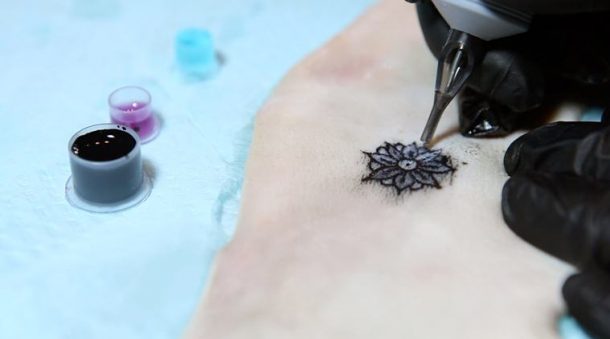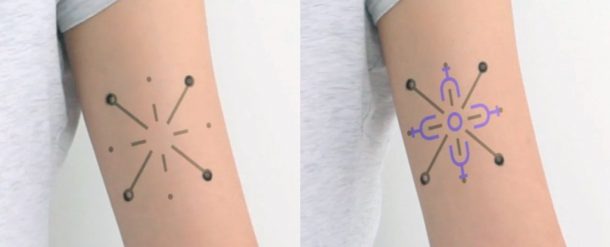A few years ago, the tattoo was just a means of expression, a trend, a condiment, or an accessory. Researchers are now using tattoos for more practical purposes like controlling your gadgets, monitoring blood alcohol level, or serve as health trackers. A team from Harvard and MIT came together to develop a smart tattoo ink to monitor blood glucose levels and report it as a color change.

With the rise of the internet of things, millions of wearables have evolved to monitor the health of our bodies. These devices are often powered by batteries and use wireless systems for communication. The bio-sensitive inks developed by Harvard and MIT use neither. These inks display results simply through a change of colors due to a chemical reaction.

The intestinal fluids in our bodies transfer nutrients to our cells and carry the waste out of them. Since these fluids work closely with blood plasma, their interaction with the inks can serve as an indicator of our blood’s chemical concentration levels.
Under the project titled “Dermal Abyss,” the researchers have developed two forms of ink. They have even tested it on patches of pig skin. One of the inks monitors the blood glucose levels and changes its color from green to brown as the glucose level rises. Another one is the green ink that turns brighter as it detects a higher level of sodium concentration to prevent dehydration.
The tattoos are meant to be the visual measures of the biometrics. However, the color-change is not pronounced enough to be noticed by the naked eye. The team has thus developed a prototype app that can analyze the tattoo with a scan.
The researchers have developed a proof of concept, and they hope to use the same idea to monitor a wider range of biometrics. Some people may avoid displaying their health information to the entire world due to some privacy concerns. To solve this problem, the ink can be developed to be visible under a certain specific light only. In this case, the sodium tracking ink appears only under blue light.
In their current forms, the tattoos do not last very long. The researchers are developing a way to improve their lifetime. It is quite a beneficial feature if you want to monitor your health for a shorter span of time as per temporary demands.
The team presented their work titled “The dermal abyss: interfacing with the skin by tattooing biosensors” at the 2017 ACM International Symposium on Wearable Computers.


